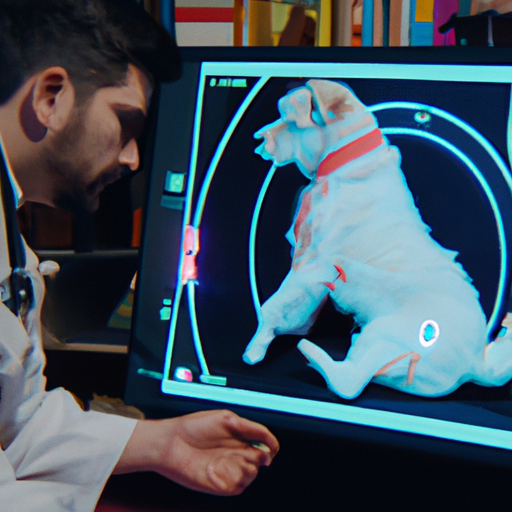Your dog is more than just a pet – it’s a member of your family. That’s why when they’re suffering from a health issue like inflamed intestines, it can feel incredibly distressing. The good news is, with the right approach and a comprehensive understanding of the condition, you can help your furry friend navigate this health challenge.
In this guide, we’re going to delve into the world of canine intestinal health, specifically focusing on inflamed intestines – what causes them, how to identify the symptoms, and most importantly, how to treat this condition.
Table of Contents
- Understanding Inflamed Intestines in Dogs
- Identifying the Symptoms
- Causes of Inflamed Intestines
- Diagnostic Process
- Treatment Options
- Dietary Changes
- Home Care Tips
- Frequently Asked Questions
Key Takeaways
- Inflamed intestines in dogs, also known as enteritis, is a common health issue.
- It can be caused by numerous factors, including dietary intolerance, infections, and parasites.
- Common symptoms include diarrhea, vomiting, loss of appetite, and weight loss.
- Treatment depends on the underlying cause but typically involves changes to the diet and possibly medication.
- Regular vet check-ups are crucial in managing and preventing this condition.
Understanding Inflamed Intestines in Dogs
When we talk about inflamed intestines in dogs, we’re typically referring to a condition known as enteritis. This inflammation can affect either the small intestine (termed enteritis) or the large intestine (colitis). In some cases, both sections of the intestine may be affected, a condition known as pancreatitis[^1^].
Inflammation in the intestines disrupts the normal digestion and absorption of food, leading to an array of gastrointestinal symptoms. If left untreated, it can result in serious health complications.
Identifying the Symptoms
Recognizing the symptoms of inflamed intestines in your dog is the first step towards getting them the help they need. Common symptoms to watch out for include:
- Diarrhea
- Vomiting
- Loss of appetite
- Weight loss
- Abdominal pain
- Lethargy
- Blood or mucus in the stool
If you notice any of these symptoms in your pet, it’s important to arrange a visit to the vet as soon as possible.
Causes of Inflamed Intestines
Just like in humans, there are many potential causes of inflamed intestines in dogs. These can include:
- Dietary intolerance or allergies
- Infections – bacterial, viral, or fungal
- Parasites
- Certain medications
- Ingesting foreign objects or toxic substances
- Inflammatory bowel disease (IBD)
- Stress
Understanding the cause of your dog’s intestinal inflammation is crucial in determining the most effective treatment plan.
Diagnostic Process
When you take your dog to the vet with symptoms of inflamed intestines, the vet will typically conduct a thorough examination and may order a number of tests. These can include blood tests, fecal tests, ultrasound scans, or endoscopy. In some cases, a biopsy may be necessary to rule out certain diseases[^2^].
Treatment Options
The treatment for inflamed intestines in dogs depends largely on the underlying cause. For instance, if your dog has an infection, the vet will likely prescribe antibiotics. If the inflammation is due to parasites, then a deworming medication will be necessary. In cases where the inflammation is caused by a dietary intolerance, a change in diet will be recommended.
Other forms of treatment can include fluid therapy for dehydration, anti-inflammatory drugs, or even surgery in severe cases.
Dietary Changes
A key part of managing inflamed intestines in dogs involves making suitable dietary changes. This might involve switching to a hypoallergenic diet, increasing fiber intake, or feeding your dog a bland diet until their symptoms improve. It’s always best to consult with your vet before making any significant changes to your dog’s diet.
Home Care Tips
In addition to medical treatment and dietary changes, there are several things you can do at home to help manage your dog’s condition and prevent future bouts of enteritis. These include:
- Regular exercise: This helps maintain a healthy digestive system and reduces stress.
- Fresh water: Always ensure your dog has access to fresh, clean water to prevent dehydration.
- Regular vet check-ups: Regular vet visits can help catch any potential issues early.
- Hygiene: Keeping your dog’s living area clean can help prevent infections.
Frequently Asked Questions
Q: Can inflamed intestines in dogs be cured?
A: This largely depends on the underlying cause. In many cases, with the right treatment and management, dogs can lead a normal, healthy life.
Q: How long does it take for inflamed intestines to heal in dogs?
A: The recovery time can vary widely depending on the cause and severity of the inflammation, as well as the overall health of the dog. It could take anywhere from a few days to several weeks.
[^1^]: PetMD – Enteritis in Dogs
[^2^]: VCA Hospitals – Inflammatory Bowel Disease in Dogs
For more information on dog health and wellness, check out these articles from our blog:



